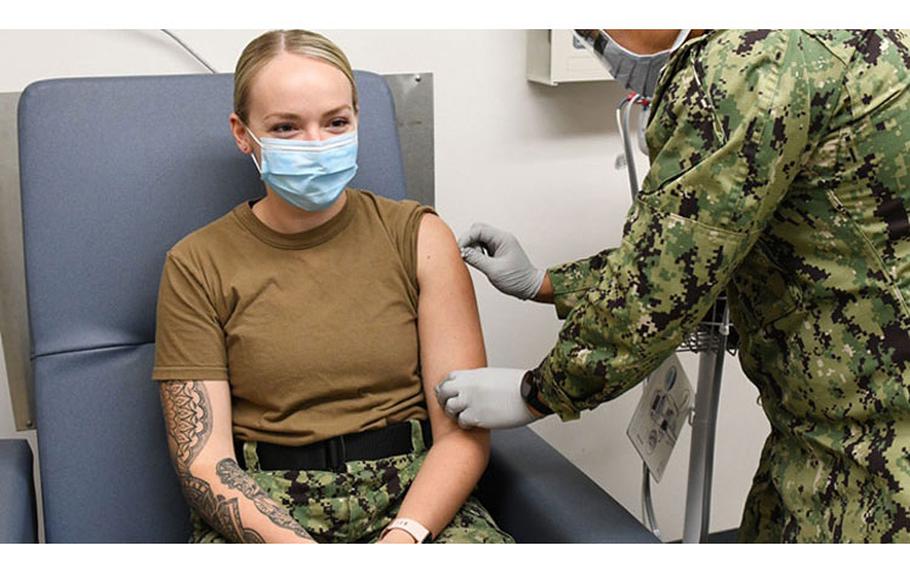Community News
MHS immunization experts will answer questions about flu vaccine
Military Health System Communications Office September 17, 2020

A hospital corpsman prepares a sailor's arm before administering a vaccine at the Navy Medical Readiness and Training Command, Pearl Harbor, Hawaii, immunization clinic. (Photo by Macy Hinds) ()
With influenza season arriving while the coronavirus is still in circulation, health care experts are worried about the potential for a perfect storm of illness. That's why experts within the Military Health System are stating that it's more important than ever this year to get the seasonal flu vaccine.
Three Military Health System immunization experts will answer beneficiaries' questions about the flu vaccine during a "Chat with TRICARE" real-time event, 3 to 4 p.m. EDT Thursday, Sept. 17, on the TRICARE Facebook page.
Participating are Air Force Col. (Dr.) Tonya S. Rans, chief of the Immunization Healthcare Division; Air Force Lt. Col. (Dr.) Ruth Brenner, deputy chief of the division; and Ann Morse, a family nurse practitioner and registered nurse at IHD’s North Atlantic Region Vaccine Safety Hub’s Satellite Office, Naval Medical Center Portsmouth, Virginia.
"Adding influenza vaccination to social distancing and masking will lower your risk of contracting two potentially serious respiratory diseases close together – which could very much worsen your outcome," said Dr. Jay Montgomery, medical director of the IHD's North Atlantic Region Vaccine Safety Hub.
"Getting the vaccine also means you're less likely to potentially expose yourself to COVID-19 by sitting in an urgent-care facility or emergency room waiting to have your flu symptoms treated," he said.
An annual flu vaccine is mandatory for all active-duty service members, Montgomery noted. He and other health care experts recommend that, generally, everyone 6 months and older should get it.
"The flu can be associated with serious illnesses, hospitalizations, and deaths," Montgomery said, particularly among older adults, very young children, pregnant women, and people of all ages with certain chronic medical conditions.
Children should be immunized even if schools don’t fully re-open, Montgomery said. "School isn't the only place where children can come in contact with viruses and bacteria that cause them to get sick," he said. "Playgrounds and grocery stores are also examples of exposure locations."
Providers' offices and immunization clinics have taken steps to protect people from COVID-19 exposure while getting a flu shot, Montgomery added. Those steps include modified appointment scheduling, physical distancing, and frequent cleaning of surfaces.
Brenner, the division's deputy chief, said the flu vaccine is likely to be available at military medical treatment facilities starting at the end of September. Supplies will continue on a rolling basis throughout the fall and winter. Beneficiaries should check with their provider or immunization clinic to be sure the vaccine is available before going to the MTF. This step will reduce unnecessary visits.
For beneficiaries interested in participating in the live Q&A, MHS experts offer the following guidelines:
Don't post personally identifiable information.
Don't refer to any specific health conditions or names of other individuals.
Stay on topic, be respectful, and tell the truth.
Add value to the conversation.
Don't spam by sending irrelevant or unsolicited messages.
More information about participating in the live chat can be found on the MHS social media webpage.